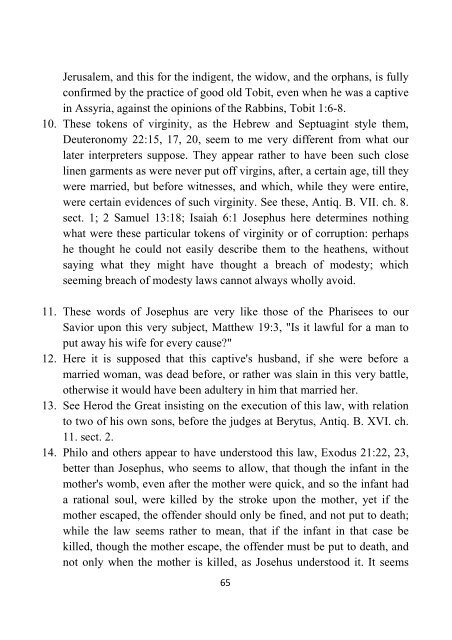From the Rejection of That Generation to the Death of Moses - Flavius Josephus
You also want an ePaper? Increase the reach of your titles
YUMPU automatically turns print PDFs into web optimized ePapers that Google loves.
Jerusalem, and this for <strong>the</strong> indigent, <strong>the</strong> widow, and <strong>the</strong> orphans, is fully<br />
confirmed by <strong>the</strong> practice <strong>of</strong> good old Tobit, even when he was a captive<br />
in Assyria, against <strong>the</strong> opinions <strong>of</strong> <strong>the</strong> Rabbins, Tobit 1:6-8.<br />
10. These <strong>to</strong>kens <strong>of</strong> virginity, as <strong>the</strong> Hebrew and Septuagint style <strong>the</strong>m,<br />
Deuteronomy 22:15, 17, 20, seem <strong>to</strong> me very different from what our<br />
later interpreters suppose. They appear ra<strong>the</strong>r <strong>to</strong> have been such close<br />
linen garments as were never put <strong>of</strong>f virgins, after, a certain age, till <strong>the</strong>y<br />
were married, but before witnesses, and which, while <strong>the</strong>y were entire,<br />
were certain evidences <strong>of</strong> such virginity. See <strong>the</strong>se, Antiq. B. VII. ch. 8.<br />
sect. 1; 2 Samuel 13:18; Isaiah 6:1 <strong>Josephus</strong> here determines nothing<br />
what were <strong>the</strong>se particular <strong>to</strong>kens <strong>of</strong> virginity or <strong>of</strong> corruption: perhaps<br />
he thought he could not easily describe <strong>the</strong>m <strong>to</strong> <strong>the</strong> hea<strong>the</strong>ns, without<br />
saying what <strong>the</strong>y might have thought a breach <strong>of</strong> modesty; which<br />
seeming breach <strong>of</strong> modesty laws cannot always wholly avoid.<br />
11. These words <strong>of</strong> <strong>Josephus</strong> are very like those <strong>of</strong> <strong>the</strong> Pharisees <strong>to</strong> our<br />
Savior upon this very subject, Mat<strong>the</strong>w 19:3, "Is it lawful for a man <strong>to</strong><br />
put away his wife for every cause?"<br />
12. Here it is supposed that this captive's husband, if she were before a<br />
married woman, was dead before, or ra<strong>the</strong>r was slain in this very battle,<br />
o<strong>the</strong>rwise it would have been adultery in him that married her.<br />
13. See Herod <strong>the</strong> Great insisting on <strong>the</strong> execution <strong>of</strong> this law, with relation<br />
<strong>to</strong> two <strong>of</strong> his own sons, before <strong>the</strong> judges at Berytus, Antiq. B. XVI. ch.<br />
11. sect. 2.<br />
14. Philo and o<strong>the</strong>rs appear <strong>to</strong> have unders<strong>to</strong>od this law, Exodus 21:22, 23,<br />
better than <strong>Josephus</strong>, who seems <strong>to</strong> allow, that though <strong>the</strong> infant in <strong>the</strong><br />
mo<strong>the</strong>r's womb, even after <strong>the</strong> mo<strong>the</strong>r were quick, and so <strong>the</strong> infant had<br />
a rational soul, were killed by <strong>the</strong> stroke upon <strong>the</strong> mo<strong>the</strong>r, yet if <strong>the</strong><br />
mo<strong>the</strong>r escaped, <strong>the</strong> <strong>of</strong>fender should only be fined, and not put <strong>to</strong> death;<br />
while <strong>the</strong> law seems ra<strong>the</strong>r <strong>to</strong> mean, that if <strong>the</strong> infant in that case be<br />
killed, though <strong>the</strong> mo<strong>the</strong>r escape, <strong>the</strong> <strong>of</strong>fender must be put <strong>to</strong> death, and<br />
not only when <strong>the</strong> mo<strong>the</strong>r is killed, as Josehus unders<strong>to</strong>od it. It seems<br />
65

















